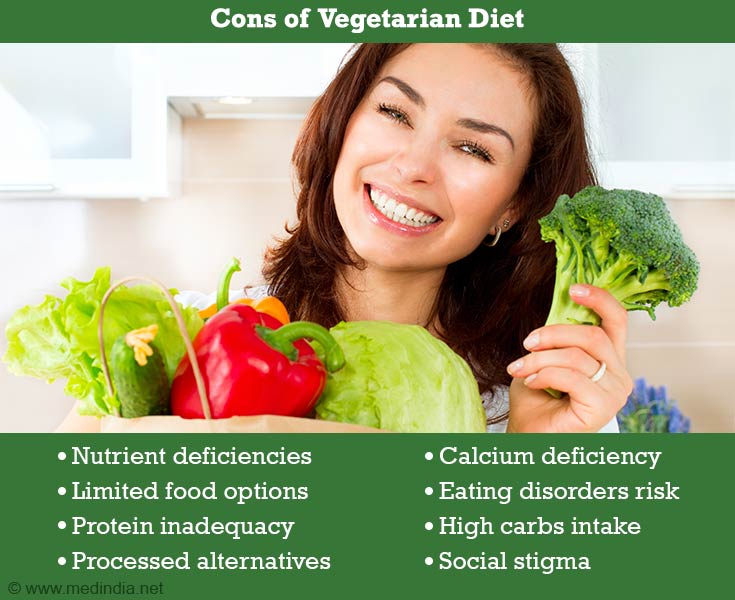- Vegetarian and vegan diets: benefits and drawbacks - (https://pubmed.ncbi.nlm.nih.gov/37450568/)
- Vegetarian Diets in the Prevention and Management of Diabetes and Its Complications - (https://pubmed.ncbi.nlm.nih.gov/28588373/)
About
The popularity of vegetarianism and veganism has soared as more people opt for plant-based diets for ethical, environmental, and health reasons in the recent times. While there are undeniable benefits to consuming a diet rich in fruits, vegetables, grains, and legumes, there are also potential drawbacks to consider(1✔ ✔Trusted Source
Vegetarian and vegan diets: benefits and drawbacks
Go to source).
Let's explore the health disadvantages of being a vegetarian and provide tips for mitigating these risks.
What is a Vegetarian Diet?
A vegetarian diet is a dietary pattern that excludes meat, poultry, and seafood. However, it may include other animal-derived products such as dairy and eggs. Some vegetarians also avoid other animal products such as gelatin and honey.
Did You Know?
While a vegetarian diet offers many benefits, it can also lead to vitamin deficiencies. Studies show that up to 83% of vegetarians are deficient in vitamin B12, a nutrient crucial for nerve function and energy production.On the other hand, a vegan diet excludes all animal-derived products, including dairy, eggs, and honey. Vegetarianism is often adopted for various reasons, including ethical, environmental, and health concerns. By focusing on plant-based foods, vegetarians aim to promote health and well-being while reducing their environmental footprint and animal exploitation.
Types of Vegetarian Diet
Vegetarian diets encompass various types like(2✔ ✔Trusted Source
Vegetarian Diets in the Prevention and Management of Diabetes and Its Complications
Go to source):
Lacto-vegetarian:
This diet includes dairy products but excludes eggs. Lacto-vegetarians rely on milk, cheese, yogurt, and other dairy items for essential nutrients like calcium and vitamin D.Ovo-vegetarian:
Ovo-vegetarians consume eggs but avoid other animal products, including dairy. Eggs are a versatile and nutrient-rich food source that provides essential amino acids, vitamins, and minerals.Lacto-ovo-vegetarian:
This is the most common type of vegetarian diet, which includes both dairy products and eggs. Lacto-ovo vegetarians have a wide range of food options and can meet their nutritional needs without consuming meat or fish.Pescatarian:
Pescatarians follow a primarily vegetarian diet but include fish and seafood in their meals. Fish is a source of omega-3 fatty acids, protein, and various vitamins and minerals, making it a valuable addition to a plant-based diet.Flexitarian:
Flexitarians are primarily vegetarian but occasionally eat meat or fish. This flexible approach allows individuals to enjoy the health benefits of a plant-based diet while still incorporating animal products in moderation.
8 Health Disadvantages of Being a Vegetarian
While vegetarian diets can be nutritious when well-planned, they may pose certain health risks due to nutrient deficiencies(1✔ ✔Trusted Source
Vegetarian and vegan diets: benefits and drawbacks
Go to source):
Calcium Deficiency:
Dairy products are a major source of calcium in many diets. Vegetarians who exclude dairy may be at risk of calcium deficiency, which can weaken bones and increase the risk of osteoporosis.Vitamin B12 Deficiency:
Vitamin B12 is primarily found in animal products, so vegetarians, especially vegans, are at risk of deficiency. B12 deficiency can lead to anemia, nerve damage, and cognitive impairment.Iron Deficiency:
Although iron is abundant in plant foods like spinach and legumes, it is less readily absorbed than the iron found in meat. Vegetarians may need to consume more iron-rich foods or pair them with vitamin C-rich foods to enhance absorption.Omega-3 Fatty Acid Deficiency:
Omega-3 fatty acids, particularly EPA and DHA, are primarily found in fatty fish. While plant-based sources like flaxseeds and walnuts contain ALA, a precursor to EPA and DHA, conversion rates are inefficient, leading to potential deficiencies in vegetarians.Limited Food Options:
Following a vegetarian diet may limit food choices, particularly when dining out or traveling. This can make it challenging to meet nutrient needs and may lead to dietary monotony.Antibiotics in Plant-Based Foods:
Conventionally grown fruits and vegetables may contain traces of antibiotics used in agriculture. Prolonged exposure to antibiotics through plant-based foods may contribute to antibiotic resistance.Dietary Imbalance:
Without careful planning, vegetarian diets may lack essential nutrients like protein, zinc, and iodine, leading to imbalances and potential health problems.Mental Health Risks:
Some research suggests a link between vegetarianism and an increased risk of mental health issues like depression and anxiety. While the exact mechanism is unclear, nutrient deficiencies and social factors may play a role.

Mistakes to Avoid on a Vegetarian Diet
To minimize the health risks associated with vegetarianism, consider the following tips:
Ensure Adequate Nutrient Intake:
Consume a variety of nutrient-rich plant foods, including fruits, vegetables, whole grains, legumes, nuts, and seeds, to meet your nutritional needs.Monitor Vitamin B12 Levels:
Consider supplementation or fortified foods to prevent B12 deficiency, especially for vegans.Include Iron-Rich Foods:
Incorporate iron-rich plant foods like lentils, beans, tofu, spinach, and fortified cereals into your diet, and pair them with vitamin C-rich foods to enhance absorption.Choose Omega-3 Sources:
Include sources of ALA, such as flaxseeds, chia seeds, and walnuts, in your diet, and consider algae-derived supplements for EPA and DHA.Diversify Your Diet:
Experiment with different cuisines, ingredients, and cooking methods to expand your palate and ensure dietary variety.Practice Mindful Eating:
Pay attention to hunger cues, practice portion control, and prioritize whole, minimally processed foods over highly refined options.Seek Professional Guidance:
Consult a registered dietitian or nutritionist for personalized dietary recommendations and guidance on meeting your nutritional goals.
By being mindful of potential nutrient deficiencies and making informed dietary choices, you can reap the benefits of a vegetarian diet while minimizing its health disadvantages. Remember to prioritize nutrient-rich foods, monitor your nutrient intake, and seek professional guidance when needed to maintain optimal health on a plant-based diet.










